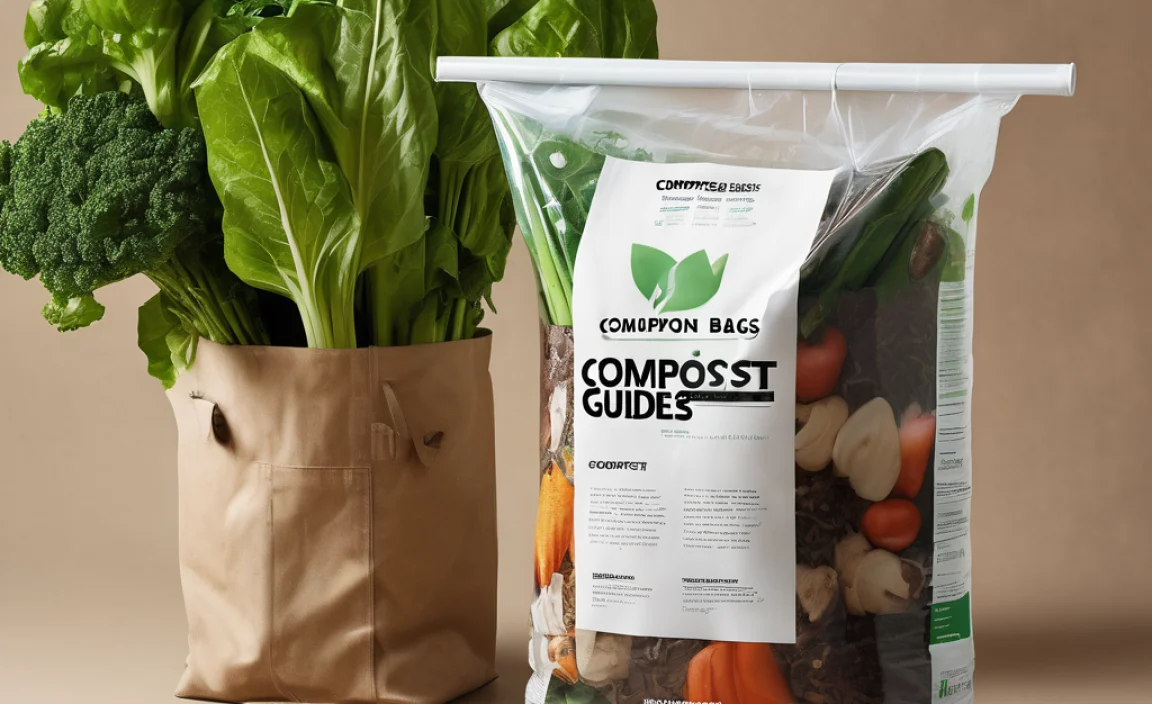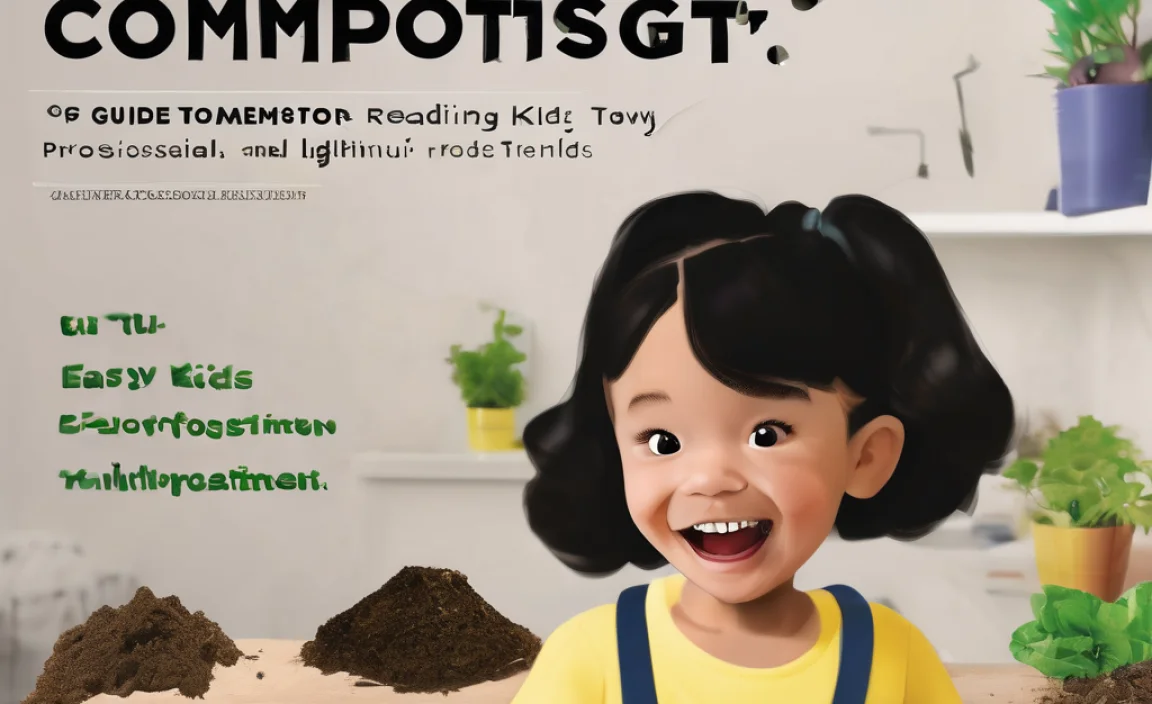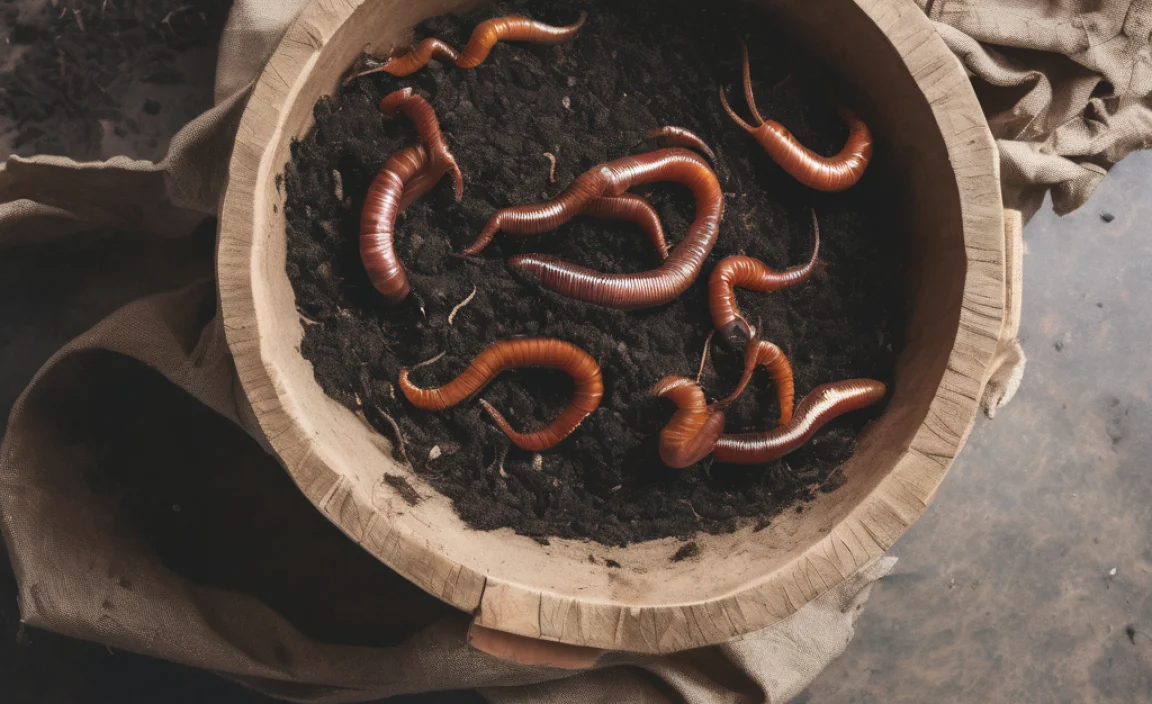Did you know that making compost is like cooking? You mix ingredients to get something wonderful. However, even in the world of composting, mistakes happen. What if you could avoid them? Many people try composting but end up with smelly piles. This article will help you learn about organic compost mistakes and how to avoid them.
Key Takeaways
- Avoid putting meat or dairy in your compost pile.
- Keep your compost pile moist like a sponge.
- Turn your compost pile often for good air flow.
- Don’t forget to balance green and brown materials.
- Avoid common organic compost mistakes to get rich soil.
Avoiding Common Mistakes
Composting is fun but needs some care. One mistake is adding meat or dairy. These attract pests and create bad smells. Keep your compost pile like a sponge: not too dry and not too wet. Another mistake is not turning the pile enough. This makes it smelly and slow to break down. Balancing green and brown materials is also vital. Greens add nitrogen while browns add carbon.
- Avoid meat and dairy in compost.
- Maintain moisture like a damp sponge.
- Turn compost to keep air flowing.
- Balance green and brown materials.
- Watch for pests and odors.
- Be patient for results.
Remember, composting transforms waste to soil. By avoiding mistakes, you help nature. Think of it as nature’s recycling system. Each time you compost, you give back to the earth. It’s a small step with big rewards.
Fun Fact or Stats : Did you know composting can reduce landfill waste by 30%?
Why Meat and Dairy Are Bad
Have you ever seen bugs buzzing around garbage? Adding meat or dairy to your compost can invite pests. These foods also rot and smell bad quickly. Imagine opening your compost bin and smelling spoiled milk. This is why sticking to vegetable scraps and leaves is better. It keeps pests away and your compost healthy. Does your compost have a bad smell? Check if you’ve made this mistake.
Keeping the Right Moisture Level
Have you ever overwatered a plant? Compost needs the right amount of moisture too. If it’s too dry, it won’t break down. If it’s too wet, it can smell. Think of a squeezed sponge. That’s how moist your compost should be. Add water if it’s dry or add dry leaves if it’s wet. Is your compost pile dry or soggy? Adjust it to keep it working.
The Importance of Turning Compost
Do you like fresh air? So does your compost pile! Turning compost gives it air, helping it break down faster. Without air, the pile can become smelly. By turning it often, you help it stay fresh. This simple action can speed up the composting process. Does your compost take too long to turn into soil? Maybe it needs some fresh air.
Balancing Green and Brown Materials
What do you think happens when you throw only grass clippings in your compost? It becomes slimy and smelly! Balancing green and brown materials is key. Greens like vegetable scraps add nitrogen. Browns like dry leaves add carbon. This balance helps compost break down nicely. Too much green makes it wet. Too much brown makes it dry.
- Use equal parts of greens and browns.
- Greens add nitrogen, browns add carbon.
- Mix materials for faster composting.
- Adjust based on weather and materials.
- Notice changes in smell and appearance.
Balancing these materials is like making a cake. Too much of one thing can ruin it. When done right, composting becomes easy. You get rich soil for your garden. Next time you compost, think about this balance.
Fun Fact or Stats : Composting can reduce greenhouse gases by up to 50%!
The Role of Greens and Browns
Why do we need both greens and browns? Greens provide the energy to heat up the pile. This heat helps break down materials faster. Browns give structure, allowing air to move. Without structure, a pile becomes compact and smelly. Have you ever seen a compost pile steam? That’s the power of green and brown balance.
Signs of an Imbalance
Have you noticed a bad smell from your compost? It could be off balance. Too much green makes it wet and smelly. Too much brown makes it dry and slow. Balance is like harmony in music; both parts must work together. If you notice bad smells or no change, adjust your mix. Consider your last compost pile—did it have the right balance?
Adjusting the Mix
How do you fix a compost pile that’s out of balance? If it’s smelly, add more browns. If it’s too dry, add greens and water. Think of it like seasoning a dish. You adjust until it’s just right. Composting is a process that needs attention. Does your compost take forever to break down? Maybe a mix change is needed.
Understanding Compost Decomposition
Have you ever wondered how compost breaks down? It’s like food being cooked slowly by nature. Tiny bugs and bacteria help decompose the waste. They need water, air, and the right mix of greens and browns. Without these, they can’t work effectively. Understanding this helps you avoid common organic compost mistakes.
- Compost breaks down with help from nature.
- Microbes need air, water, and food.
- Balance helps them break down waste.
- Heat speeds up the process.
- Compost becomes soil over time.
Think of your compost like a living creature. It needs care and feeding. When treated well, it rewards you with rich soil. This soil is perfect for growing plants. Remember, composting is nature’s way of recycling. The less you disturb it, the better it works.
Fun Fact or Stats : A well-made compost pile can reach 160°F!
The Microbes’ Role in Compost
Do you know who the real workers in your compost are? Tiny microbes! These tiny creatures eat the waste and turn it into soil. They need a good environment to work. Without air and water, they can’t survive. Ever notice steam rising from a compost pile? That’s the microbes working hard. Are you helping your microbes thrive?
Temperature in Composting
Have you ever touched a warm compost pile? Heat is a sign of activity. It means the microbes are busy breaking down materials. A hot compost pile works faster. You can check temperature with a thermometer. If it’s cold, maybe it’s time to turn the pile. Is your compost pile hot or cold? Maybe it needs some attention.
Speeding Up Decomposition
Do you want your compost to break down faster? Turn the pile and keep it moist. Cut materials into smaller pieces. These steps help microbes work better. It’s like giving them a head start. Have you tried shredding leaves before composting? It can make a big difference. Is your pile taking too long? Try these tips for faster results.
Using a Compost Table
Sometimes seeing information in a table helps understand better. Let’s compare some key points in composting. The table below shows dos and don’ts in composting. It helps you avoid organic compost mistakes and make better compost.
| Do | Don’t | Reason |
|---|---|---|
| Add vegetable scraps | Add meat or dairy | Prevents bad smells and pests |
| Turn the pile often | Leave it untouched | Keeps air flow and speeds up process |
| Balance greens and browns | Use only one type | Ensures proper decomposition |
| Keep it moist | Let it dry out | Moisture is needed for breakdown |
This table helps you remember what to do and what to avoid. Use it as a guide for your composting journey. Avoiding these mistakes leads to healthy, rich compost. Next time you compost, think of this table and make smart choices.
Fun Fact or Stats : Composting reduces household waste by 50%!
Signs Your Composting is Successful
How do you know if your composting is working? Look for certain signs. A successful compost pile is rich and dark like soil. It smells earthy, not rotten. Materials should break down over time. If you see worms, it’s a good sign. They help break down the compost even faster. These signs show your composting is on the right track.
- Dark, rich, soil-like appearance.
- Earthy smell, not rotten.
- Materials slowly disappear over time.
- Presence of worms is beneficial.
- Consistent temperature around 120°F to 160°F.
If your compost doesn’t have these signs, don’t worry. Adjust your mix, turn it more, or check moisture. Composting is a living process that can be fixed. By focusing on the signs, you can make sure it’s working. With practice, you’ll make amazing compost.
Fun Fact or Stats : Earthworms can eat their weight in compost every day!
Color and Smell
What color should compost be? Dark and rich! It should look like soil, not leaves. The smell is also a clue. Good compost smells earthy, like a forest floor. Have you noticed a bad smell? It might mean it’s not breaking down right. Adjusting balance or moisture can help. Do you have dark, earthy compost?
Disappearing Materials
Have you ever wondered where all the scraps go? Over time, they disappear and become compost. If you notice materials are still there, the pile may need help. It could mean not enough air, moisture, or balance. Adjust the conditions and keep checking. Is your compost breaking down? If not, give it more attention.
Why Worms are Good
Have you found worms in your compost? They are great helpers! Worms eat the compost and make it better. Their movements create air spaces, helping decomposition. Some people even start worm farms to make compost faster. Would you like worms in your compost? They are a sign of a healthy pile.
Conclusion
Composting is a wonderful way to recycle and create rich soil. By avoiding organic compost mistakes, you make the process easier and faster. Remember to balance materials, keep it moist and turn it often. With these tips, you’ll have perfect compost every time. Happy composting!
FAQs
Question: Why shouldn’t I add meat to my compost?
Answer: Meat attracts pests and creates bad smells in your compost pile. It can also slow down the decomposition process. To avoid these organic compost mistakes, stick to vegetable scraps and garden waste. This keeps your compost healthy and odor-free.
Question: How often should I turn my compost?
Answer: Turning your compost once a week or every two weeks is ideal. This helps air flow and speeds up decomposition. Regular turning prevents bad smells and keeps the pile working well. Remember, like stirring a pot, it helps everything mix evenly.
Question: What are green and brown materials in composting?
Answer: Green materials are rich in nitrogen, like vegetable scraps and grass clippings. Brown materials are rich in carbon, like dry leaves and paper. Balancing these prevents common organic compost mistakes like bad smells and slow decomposition. Together, they create a healthy compost pile.
Question: How can I tell if my compost is too dry?
Answer: If your compost is too dry, it won’t decompose well. It should feel like a damp sponge. Add water or green materials to fix it. Dry compost is a common mistake, but easy to correct. Keep an eye on moisture to ensure success.
Question: Is it normal for compost to steam?
Answer: Yes, it’s normal! Steam means your compost is active and working well. Microbes generate heat as they break down materials. A steaming pile indicates a healthy, hot composting process. If there’s no steam, check moisture and air supply.
Question: Why do I need worms in my compost?
Answer: Worms are helpful in composting. They eat organic material and make rich soil. Their movement helps air flow, speeding up decomposition. Finding worms in your compost is a good sign of a healthy pile. Consider adding worms to boost your composting efforts.



